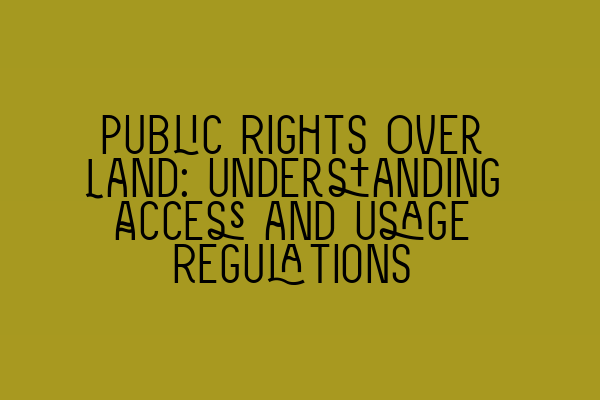Public Rights Over Land: Understanding Access and Usage Regulations
Public rights over land outline the legal rules and regulations regarding access and usage of land by the general public. These rights are essential in ensuring that everyone has equal opportunities to enjoy and utilize certain areas for recreational activities, transportation, and other legitimate purposes.
As a property law specialist at SQE Property Law & Land Law, I understand the importance of comprehending public rights over land and their implications for both landowners and the public. In this blog post, I will guide you through the key concepts and regulations surrounding public access and usage of land.
Understanding Public Rights Over Land
Public rights over land are a product of long-standing legal traditions and principles. They serve as a vital component of land use planning, environmental protection, and community development. These rights are typically established through legislation, common law, or specific agreements between landowners and public authorities.
There are several types of public rights over land, including:
- Right of Way: This refers to the legal right for individuals to pass through a specific area, such as a pathway, road, or footpath. It allows people to travel between different locations, access amenities, and engage in recreational activities. The right of way is usually established and maintained by local authorities.
- Right to Recreation: Public lands, such as parks, forests, and beaches, provide opportunities for individuals to engage in recreational activities. These areas are often protected by legislation to ensure that everyone has the right to access and enjoy these natural resources.
- Right to Navigable Waters: Navigable waters, such as rivers, lakes, and oceans, are considered public resources. The public has the right to use these waters for various purposes, including fishing, boating, and transportation. However, restrictions may apply to protect the environment and ensure safety.
- Right to Public Utilities: Certain utilities, such as gas, electricity, and water, are considered essential for public welfare. Public rights over land may include the right to access and utilize these utilities, subject to applicable regulations and agreements.
Legal Framework and Regulations
The legal framework surrounding public rights over land varies between jurisdictions, as it depends on the specific legislation and common law principles in each country or region. In the United Kingdom, for example, the Countryside and Rights of Way Act 2000 is a crucial piece of legislation that governs public access and usage of land.
This Act provides individuals with the right to access certain areas of land, known as “open access land,” for recreational purposes. Open access land includes mountains, moorland, heathland, and common land. However, landowners still retain control over their property and may impose certain restrictions to protect sensitive areas or ensure public safety.
Additionally, various public authorities, such as local councils and national parks, have the power to create bylaws and regulations that govern public rights over land within their jurisdiction. It is essential to consult these regulations to understand the specific rights and restrictions applicable to a particular area.
Respecting Boundaries and Restrictions
While public rights over land allow individuals to access and use certain areas, it is crucial to respect the boundaries and restrictions established by landowners and public authorities. Trespassing or violating specific regulations can lead to legal consequences.
Before entering private land or utilizing public access routes, it is advisable to familiarize yourself with any signage or notices that indicate restrictions or guidance. These may include time restrictions, designated routes, or rules on activities permitted in the area.
By respecting these boundaries and restrictions, we can maintain a harmonious balance between public access and landowners’ rights.
Consulting a Property Law Specialist
Public rights over land can be complex, and their interpretation may vary depending on the specific circumstances. As a property law specialist at SQE Property Law & Land Law, I highly recommend consulting a legal professional if you have any concerns or queries regarding public rights over land.
Our team of experienced solicitors can provide expert advice on public access and usage regulations, ensuring that you understand your rights and responsibilities. Whether you are a landowner seeking to protect your property or an individual looking to exercise your public rights, SQE Property Law & Land Law is here to help.
For further preparation materials and resources related to the SQE exams, consider checking out our SQE 1 Practice Exam Questions and SQE 1 Practice Mocks FLK1 FLK2. We also offer comprehensive SQE 2 Preparation Courses and SQE 1 Preparation Courses to help you succeed in your legal career. Stay updated with the latest SRA SQE Exam Dates to ensure you plan your study and revision effectively.
At SQE Property Law & Land Law, we are committed to providing reliable and accurate information to our clients. Contact us today for expert advice on public rights over land and other property law matters.
